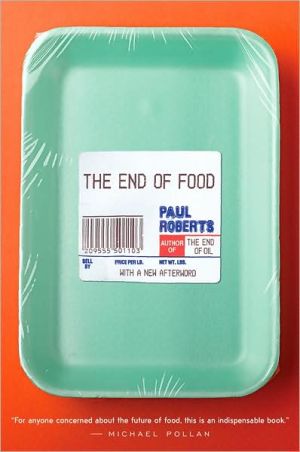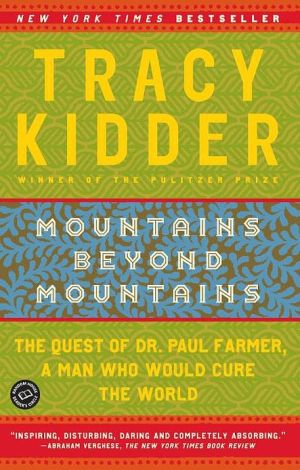The End of Food
Salmonella-tainted tomatoes, riots, and skyrocketing prices are only the latest in a series of food-related crises that have illuminated the failures of the modern food system. In The End of Food, Paul Roberts investigates this system and presents a startling truth—how we make, market, and transport our food is no longer compatible with the billions of consumers the system was built to serve.\ The emergence of large-scale and efficient food production forever changed our relationship with...
Search in google:
Salmonella-tainted tomatoes, riots, and skyrocketing prices are only the latest in a series of food-related crises that have illuminated the failures of the modern food system. In The End of Food, Paul Roberts investigates this system and presents a startling truth—how we make, market, and transport our food is no longer compatible with the billions of consumers the system was built to serve.The emergence of large-scale and efficient food production forever changed our relationship with food and ultimately left a vulnerable and paradoxical system in place. High-volume factory systems create new risks for food-borne illness; high-yield crops generate grain, produce, and meat of declining nutritional quality; and while nearly a billion people are overweight, roughly as many people are starving.In this vivid narrative, Roberts presents clear, stark visions of the future and helps us prepare to make the necessary decisions to survive the demise of food production as we know it. Publishers Weekly This potentially interesting investigation into the challenges of global food production and distribution is marred by the burial of its argument at the end of the book. Beneath a history of food (old news to any reader of Michael Pollan), factoid avalanches and future-tense fretting, Roberts (The End of Oil) makes a familiar plea for rethinking food systems. When the author illustrates his points with actual players, the narrative becomes affecting and memorable: a French meat packer shows how retail powerhouses dictate prices; a Kenyan farmer demonstrates how "hunger-ending" technologies are often poorly suited to the climates, soils and infrastructures in malnourished regions. Unfortunately, these anecdotes are overshadowed by colorless recitations of Internet research and data culled from interviews. Roberts worries about our "vast and overworked [food] system" and proffers the usual solutions: eat less (land-based) meat, farm more fish, support regional (not just local) agriculture and pressure food policy makers to fund research into more sustainable farming methods (including genetic modification). Despite the undeniable urgency of the issue, Roberts's arguments are as commonplace as his prescriptions. (June 4)Copyright © Reed Business Information, a division of Reed Elsevier Inc. All rights reserved.
1 Starving for Progress 32 It's So Easy Now 293 Buy One, Get One Free 574 Tipping the Scales 825 Eating for Strength 1136 The End of Hunger 1447 We Are What We Eat 1758 In the Long Run 2059 Magic Pills 23910 Food Fight 269Epilogue: Nouvelle Cuisine 298Acknowledgments 323Notes 324Bibliography 363Index 366
\ From Barnes & NobleAccording to the World Health Organization, much of the earth's population is either overeating or starving themselves to death. Over 1.1 billion people consume so much food daily that they are at risk of obesity-related illness; another billion are dying of malnutrition. But according to Paul Roberts's lively critique, our problems are just beginning. In The End of Food, he delineates trends that are effectively ending the age of food superabundance. He describes the long-term destructive effects of low-cost mass food production, explaining how these shortcuts and preventive measures actually irreparably damage our capacity to feed the world's people. Another laser-sharp jeremiad by the author of The End of Oil.\ \ \ \ \ Publishers WeeklyThis potentially interesting investigation into the challenges of global food production and distribution is marred by the burial of its argument at the end of the book. Beneath a history of food (old news to any reader of Michael Pollan), factoid avalanches and future-tense fretting, Roberts (The End of Oil) makes a familiar plea for rethinking food systems. When the author illustrates his points with actual players, the narrative becomes affecting and memorable: a French meat packer shows how retail powerhouses dictate prices; a Kenyan farmer demonstrates how "hunger-ending" technologies are often poorly suited to the climates, soils and infrastructures in malnourished regions. Unfortunately, these anecdotes are overshadowed by colorless recitations of Internet research and data culled from interviews. Roberts worries about our "vast and overworked [food] system" and proffers the usual solutions: eat less (land-based) meat, farm more fish, support regional (not just local) agriculture and pressure food policy makers to fund research into more sustainable farming methods (including genetic modification). Despite the undeniable urgency of the issue, Roberts's arguments are as commonplace as his prescriptions. (June 4)\ Copyright © Reed Business Information, a division of Reed Elsevier Inc. All rights reserved.\ \ \ Kirkus ReviewsFrom Harper's contributor Roberts (The End of Oil, 2004), another dire warning of hard times ahead. This time the author scrutinizes the modern food system, examining its history from prehistoric big-game hunting through the rise of industrialized food production to the retail revolution in which large grocery companies control the supply chain. The result, he asserts, is a low-cost, high-volume model that has reduced the nutritional value of processed food and increased such health problems as obesity and diabetes; it offers superabundance to a few while millions of others go hungry. Roberts argues that the present system is critically vulnerable not only to escalating energy costs and declining supplies of land and water but to the threats of climate change, soil contamination and food-borne diseases. He paints a horrific picture of how all these factors could come together in what he calls " a perfect storm of sequential or even simultaneous food-related calamities" that begins with wheat rust in Uganda and cascades into a global crisis involving droughts, floods, unemployment, mass migrations and a deadly epidemic. To understand how the system operates, the author visited food giant Nestle in Switzerland, a meat-packing plant in France, an agricultural fair in China's Shandong Province and an Albertsons market in Washington state, among other sites, and he consulted with politicians and scientists involved in protecting and expanding the food supply. In his search for solutions, Roberts examines genetically modified foods, organic and integrated polyculture farming, aquaculture and the growing locavore movement ("eat food grown locally"), all of which hold promise but none of whichhas all the answers. The key to change, he declares, lies with an informed and activist public, which is precisely what his book aims to create and energize. A revealing, deeply dismaying overview of how the world's food is produced and marketed. Agent: Heather Schroder/ICM\ \








